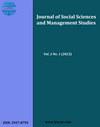Regulation of Sanctions in Increasing Supervision of the Food and Drug Supervisory Agency (BPOM) Against the Circulation of Food and Drugs Containing Hazardous Materials
引用次数: 0
Abstract
Processed food products circulating in the market do not all provide guarantees of quality and safety for consumers. The number of cases that afflict consumers due to consuming processed food products that do not meet the specified quality standards, for example the case of packaged milk containing melamine, non-halal adjinomoto cooking spices, candy containing addictive substances, and others. The problems discussed in writing this article are the form of increased supervision of the Food and Drug Supervisory Agency (BPOM) on the circulation of food and drugs containing hazardous materials and the efforts of the Food and Drug Supervisory Agency regarding the circulation of food containing hazardous materials. The research method used in the provisions governing the existence of sanctions in order to increase effective supervision for perpetrators who violate these rules. So it is hoped that strict sanctions for business actors who violate in the context of writing articles are normative legal research, in the form of research by examining laws and regulations that are related to legal problems that occur. The results of the study form ways to improve supervision carried out by BPOM by indirectly forming an integrated food supervision network with other agencies such as the agriculture department, the trade department, which collaborate in particular to conduct a supervision team on the circulation of food and drugs containing hazardous materials. Therefore, BPOM must carry out its duties and functions collectively to prevent business actors from committing fraud by using materials containing hazardous substances. Then the efforts made by the Food and Drug Supervisory Agency related to the distribution of food containing hazardous materials, namely preventive and repressive efforts. As for suggestions from the author, namely the Food and Drug Supervisory Agency to carry out intensive and equitable supervision to minimize the circulation of food containing hazardous materials that endanger public health and it is recommended to take preventive and repressive protection efforts.加强食品药品监督机构(BPOM)对含有有害物质的食品和药品流通的监督的制裁条例
市场上流通的加工食品并不都能为消费者提供质量和安全的保证。消费者因食用不符合规定质量标准的加工食品而受到影响的案例数量,例如含有三聚氰胺的包装牛奶、非清真调味品、含有成瘾性物质的糖果等。本文讨论的问题是食品药品监督机构(BPOM)对含有有害物质的食品和药品流通加强监督的形式,以及食品药品监督机构对含有有害物质的食品流通的努力。在有关制裁存在的条款中使用的研究方法,以便加强对违反这些规则的犯罪者的有效监督。因此,希望在撰写文章的背景下,对违反法律的企业行为者进行严厉的制裁,是规范性的法律研究,以研究与发生的法律问题相关的法律法规的形式进行研究。研究的结果为改善对二苯甲醛的监管提供了途径,方法是与农业部、贸易署等其他机构间接建立一个综合的食物监管网络,特别是就含有有害物质的食物和药物的流通组成一个监管小组。因此,BPOM必须共同履行其职责和功能,以防止业务行为者通过使用含有有害物质的材料进行欺诈。然后是食品和药物监管机构所做的与含有有害物质的食品分布有关的努力,即预防和抑制努力。至于提交人的建议,即食品和药物监管机构应进行密集和公平的监管,以尽量减少含有危害公众健康的有害物质的食品流通,并建议采取预防性和抑制性保护措施。
本文章由计算机程序翻译,如有差异,请以英文原文为准。
求助全文
约1分钟内获得全文
求助全文
来源期刊

Journal of Social Sciences and Management Studies
Social Sciences and Management Studies-
自引率
0.00%
发文量
0
期刊介绍:
Journal of Social Sciences and Management Studies (ISSN: 2957-8795) is a peer reviewed journal focuses on integrating theory, research and practice in the area of management and social sciences. The journal discusses the distinctive disciplinary practices within the sciences of the management and social field and examines examples of these practices. In order to define and exemplify disciplinarity, the journal fosters dialogue ranging from the broad and speculative to the microcosmic and empirical. In considering the varied interdisciplinary, trans-disciplinary or multidisciplinary work across and between the social, natural and applied sciences, the journal showcases interdisciplinary practices in action. The focus of papers ranges from the finely grained and empirical, to wide-ranging multi-disciplinary and transdisciplinary practices, to perspectives on knowledge and method.
 求助内容:
求助内容: 应助结果提醒方式:
应助结果提醒方式:


